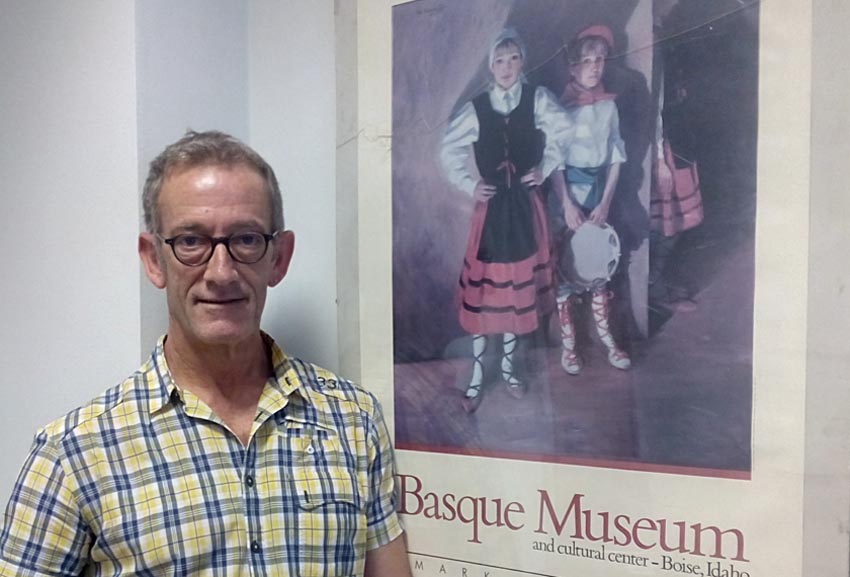Joseba Etxarri. The Basque Government has put forth great effort over the last 20 years to address the demand in many Basque clubs around the world to teach Basque. This year marks the 25th year that teachers in Macachin Argentina, in the middle of the Pampa, began the Argentinan Euskaraz program, that later grew and was renamed Euskara Munduan. Jose Francisco Zinkuinegi, for most Kinku Zinkunegi, is who has coordinated this initiative, for almost 20 years. The program aims to teach and to train Basque teachers in the Diaspora. Zinkunegi supports them on this journey from HABE.
The numbers are not bad: 2,100 adult students studying Basque in 80 Basque clubs in 15 countries in Europe, America and even Australia.
-It is a reality that has emerged gradually, we try on our part to respond, in the best way possible and with the means at hand, to the demands of the clubs at any given moment. There are still Basque clubs who would like to incorporate Basque classes but haven’t been able yet, most of the time because of lack of teachers, but there is no doubt that we have made a lot of progress over the last 25 years since that pioneer group in Machachin. There are some members of that initial group that still continue as Basque teachers and dominate the language, having been born 10,000 kilometers from the Basque Country.
There was a time when Basque teachers came to clubs from Euskadi. Today the goal is to train local teachers.
-We want the Basque clubs to be as autonomous as possible and have their own teachers. We provide training and teaching material and they supply the people, the dedication and excitement. Anyone wishing can start from scratch, learn and eventually become a teacher, after a four years training, for free, with the commitment that in turn they will teach in their own club. They take the classes online and once or twice a year attend a regional barnetegi that we host in the South Cone or the US. They accept the commitment with their own Basque club that follows their progress and the results, which is a condition for using public monies. In many cases, they have already begun to teach beginning classes even if they are in their third year of training.
Are there many dropouts?
-The students start from zero and the first year is usually the decisive one. From there, anyone who continues usually finishes the training period. And then a small miracle happens; you see people who at their first barnetegis – in Argentina, for example, we hold two a year in January and July – who were ready to give up, and then all of the sudden, they realize that they start to be able to communicate and then suddenly the world is open to them. You speak with them after a time and they tell you that it was hard at first, and that it required a lot of effort, but that learning Basque has changed their lives. They sometimes tell you that they now see Basque culture differently, or they feel their Basqueness differently. There are paradigmatic examples of people in the Diaspora that have been integrated completely in the Basque club or to Basque and the Basque culture, or get stronger in their Argentine-Basqueness, Uruguayan-Basqueness or American-Basqueness differently to name a few.
What do you miss most in the Basque clubs related to Euskera.
-More and more Basque clubs are joining in the collective and personal effort for Euskera. Since you ask, in my opinion, more could be done in terms of visibility of the language, its use on stationary, posters, signage, or for example websites of the different clubs and federations.
Out of curiosity how did your relationship with the Diaspora begin?
-I started teaching at a municipal Euskaltegi for HABE in 1983 in Urretxu, later at a barnetegi in Hondarribia, where I was the director, and later I joined the central HABE headquarters in Donostia. There, on a beautiful January day, the director at the time, Josune Ariztondo, called me into her office and asked me, just like that, if I was able to go to Argentina for several weeks. Soon after, I traveled on January 19th, the night before San Sebastian I was in Argentina teaching class in Tandil. I remember with tons of books and paper in my suitcase, because then there were no hard drives or pen drives.
You exchanged the Euskaltegis from here for those there…
-I joined a very interesting world that is as much ours as the Diaspora. With its 2,100 adult students the Diaspora is the largest Euskaltegi of Euskal Herria.






 Send to a friend
Send to a friend Add comment
Add comment








